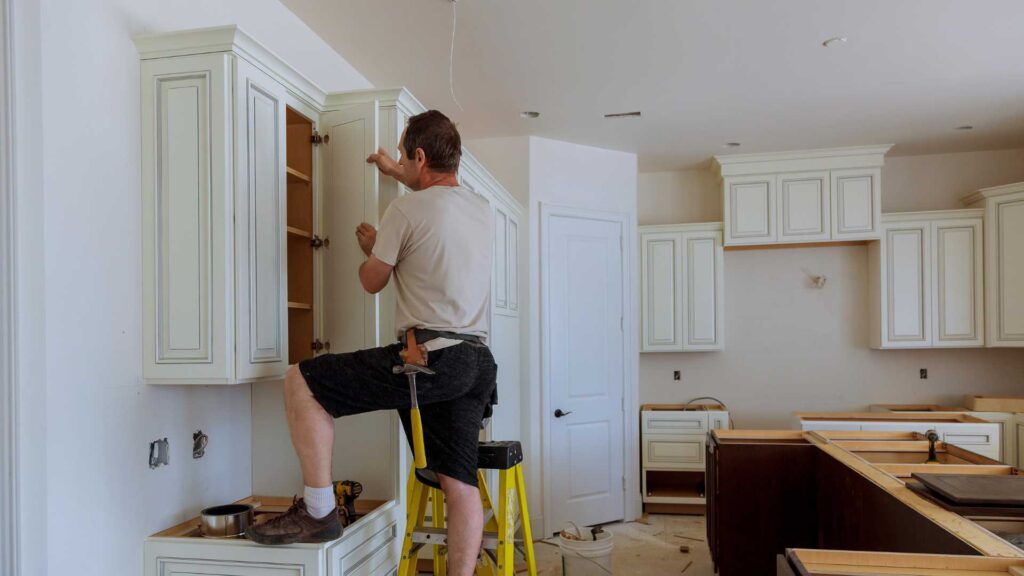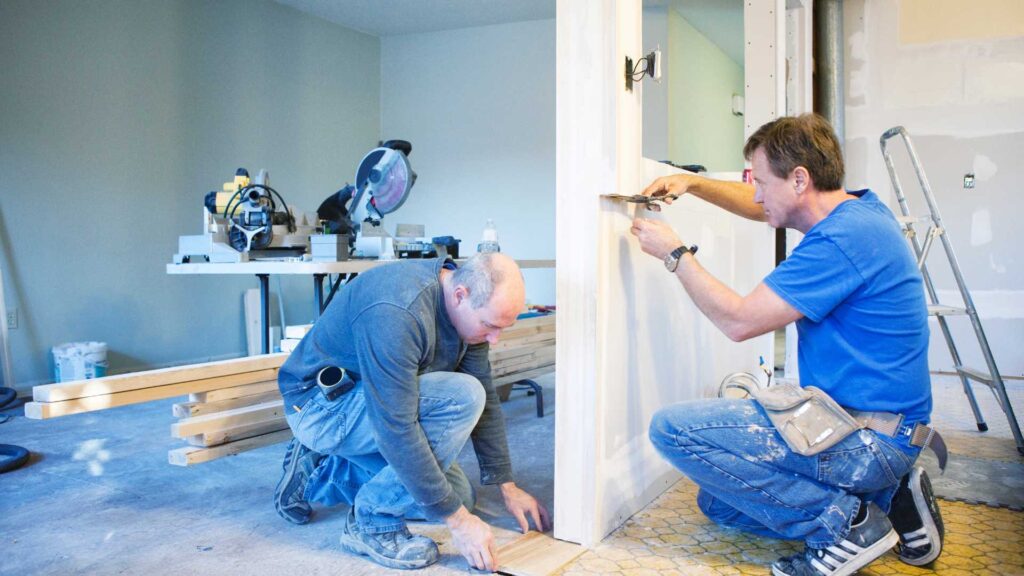Kitchen renovations are often among the most rewarding yet challenging home improvement projects. Whether you’re looking to enhance your culinary space for personal enjoyment or boost your property’s value, understanding the average time frame for a kitchen renovation is crucial to setting realistic expectations. Numerous factors, such as the renovation’s scope, the kitchen’s size, and the availability of materials and contractors, can vary significantly.
While some homeowners may envision a quick makeover that can be completed in weeks, others may find that their project extends over several months. From initial planning and design to demolition, installation, and final touches, each phase of the renovation method calls for meticulous planning, attention to detail, and coordination. In this post, we’ll examine the numerous elements that affect how long a kitchen makeover takes, Providing you with a comprehensive understanding of what to expect as you embark on your kitchen transformation journey.
Summary
A kitchen renovation typically takes 6 weeks to 3 months, depending on factors like the project’s scope, kitchen size, and contractor availability. Minor updates (e.g., repainting, replacing countertops) can be completed in 1 to 4 weeks, while major renovations (e.g., structural changes, custom cabinetry) can require up to three months or six weeks. The timeline is also influenced by whether custom or pre-made elements are used and by the timing of contractor availability and necessary permits. Proper planning, early decision-making, and choosing reliable contractors can help avoid delays.
Typical Kitchen Renovation Timeline: A Step-by-Step Guide
Understanding the typical sequence of events during a kitchen renovation can help you plan better and anticipate potential delays. Here’s a breakdown of the stages involved and their expected durations.
Planning And Design (2 To 4 Weeks)
The first stage of your renovation involves planning and design. During this phase, you’ll work with a designer or contractor to finalise the layout, select materials, and create a detailed plan. Depending on how intricate your design is and how quickly decisions are made, this procedure usually takes two to four weeks.
Demolition (1 To 2 Weeks)
Once your plan is finalised, the demolition phase begins. This involves removing old cabinets, countertops, appliances, and sometimes even walls. Depending on the scope of the work, demolition can require one to two weeks.
Structural Work (2 To 4 Weeks)
If your renovation includes structural changes, such as moving walls, updating plumbing, or rewiring, this stage can take an extra two to four weeks. However, it is crucial since it establishes the framework for the rest of the renovation.
Installation (4 To 8 Weeks)
The installation phase is often the most time-consuming part of a kitchen renovation. This stage includes fitting new cabinets, countertops, flooring, and appliances. Depending on the complexity of the installation and whether you’re using custom or pre-made elements, this phase can take 4 to 8 weeks.
Finishing Touches (1 To 2 Weeks)
The final stage of the renovation involves adding finishing touches, such as painting, installing light fixtures, and completing any remaining trim work. Typically, this stage takes one to two weeks. However, it can extend longer if there are delays in material delivery or final inspections.
Final Inspection And Handover (1 Week)
After the renovation, a final inspection ensures everything is up to code and finished to your satisfaction. This stage typically takes about a week, after which your kitchen is ready for use.
Key Factors Affecting The Kitchen Renovation Timeline
Several factors determine the duration of a kitchen renovation. While some projects can be completed in just a few weeks, others may extend over several months. Below, we explore the main elements affecting the length of your renovation.
Scope Of The Renovation
The scale of your renovation is one of the most significant determinants of the timeline. A simple update is naturally quicker to complete than a full-scale renovation that involves major changes.
Minor Renovations
Minor kitchen renovations typically involve:
- Repainting walls and cabinets
- Replacing countertops
- Upgrading light fixtures
- Installing new appliances
Such updates usually take between 1 to 4 weeks. The timeline depends on the materials’ availability and the contractors’ efficiency.
Major Renovations
For a major renovation, which may include:
- Knocking down walls
- Changing the layout
- Installing new plumbing and electrical systems
- Custom cabinetry
These extensive projects can range from 6 weeks to 3 months or more, depending on the complexity of the work and any unforeseen challenges that arise during construction.
Size Of The Kitchen
One of the most important factors in selecting the renovation timeline. Larger kitchens naturally require more work, from cabinetry and flooring to painting and tiling.
Small Kitchens
Renovations for smaller kitchens may be completed more quickly, typically within 4 to 8 weeks. The reduced space means fewer materials and less labour, though custom elements or significant layout changes could extend this timeframe.
Large Kitchens
In contrast, larger kitchens often take 8 to 12 weeks or longer to renovate, especially if they include custom features or extensive structural changes.
Custom Vs. Pre-Made Elements
Choosing between custom and pre-made elements is another critical factor affecting renovation time.
Custom Elements
Opting for custom cabinetry, countertops, or other bespoke features can significantly extend the renovation timeline. Custom elements require time to design, fabricate, and install, potentially adding several weeks to your project.
Pre-Made Elements
Using pre-made or stock items is generally faster. These elements are readily available and can be installed more quickly, making them a good choice if you must adhere to a strict schedule.
Contractor Availability
The availability of contractors can be a significant bottleneck in your renovation timeline, especially during certain times of the year.
High-Demand Seasons
Contractors are often in high demand during the most popular renovation seasons, like spring and summer. If you’re unable to book your preferred team right away, this can lead to delays.
Off-Peak Seasons
Scheduling your renovation during the off-peak winter months might help you secure a contractor more quickly, potentially shortening the timeline.
Permits And Inspections
Depending on the nature of your renovation, you may need to obtain various permits and undergo inspections, which can extend the project’s duration.
Permitting Process
Permit application times can vary greatly based on your region and the particulars of your renovation. In some areas, permits can be secured within a few days, while in others, they might take several weeks.
Inspections
Inspections are required at various stages of the renovation, particularly if you’re making structural changes or updating plumbing and electrical systems. Scheduling these inspections and addressing any required changes can add time to the project.
Tips To Avoid Delays In Your Kitchen Renovation
While some delays are inevitable, proper planning and proactive communication can help keep your renovation on track. Here are some practical tips to minimise disruptions and avoid extending your timeline unnecessarily.
Hire Reliable Contractors
Choosing reputable, experienced contractors is one of the best ways to ensure a smooth renovation. Always check references, read reviews, and confirm that your contractors are licensed and insured. Reliable professionals are less likely to cause delays and more likely to deliver quality work on time.
Plan And Decide Early
The more decisions you make during the planning phase, the less likely you will encounter delays later. Finalise choices on materials, finishes, and appliances as early as possible to avoid last-minute changes that could slow down the process.
Order Materials In Advance
Order all materials well in advance, particularly custom items. Backorders or shipping delays can significantly impact your timeline, so ensuring everything is on hand before work begins can help prevent unnecessary waiting.
Maintain Flexibility
Flexibility is key when navigating a renovation. Unexpected issues can arise at any stage, so being prepared to make quick decisions or adjustments will support the continued progress of your project and avoid costly delays.
Conclusion
The typical amount of time needed to renovate a kitchen can range from 6 weeks to 3 months or more, depending on some variables, including the project’s scope, the amount of your kitchen, and the availability of contractors. By carefully planning your renovation, making decisions early, and working with reliable professionals, you can help ensure a smoother, more efficient process.
Whether tackling a minor refresh or a comprehensive overhaul, understanding the timeline and potential challenges will help you confidently navigate the renovation. With the right preparation and expectations, you can achieve the kitchen of your dreams within a timeframe that works for you.
Frequently Asked Questions About Kitchen Renovation
What Materials Should I Choose For Countertops?
Popular choices for countertops include granite, quartz, marble, and laminate. The best material depends on your budget, style preferences, and how much maintenance you’re willing to do.
Can I Live In My House During The Renovation?
Yes, but it can be challenging. The kitchen is often the heart of the home, so you’ll need to set up a temporary kitchen elsewhere and be prepared for noise, dust, and limited access to your cooking area.
How Can I Maximise Storage In My New Kitchen?
To maximise every inch of space, consider custom cabinetry, pull-out shelves, lazy Susans, deep drawers, and vertical storage solutions.
Is It Necessary To Upgrade My Kitchen Appliances During Renovation?
If your appliances are outdated or don’t fit with the new design, upgrading them can be a good idea. Energy-efficient models are also a wise investment for long-term savings.
What Permits Are Required For A Kitchen Renovation?
Depending on the extent of the renovation, you may need permits for electrical, plumbing, or structural changes. Check with your local building department.



